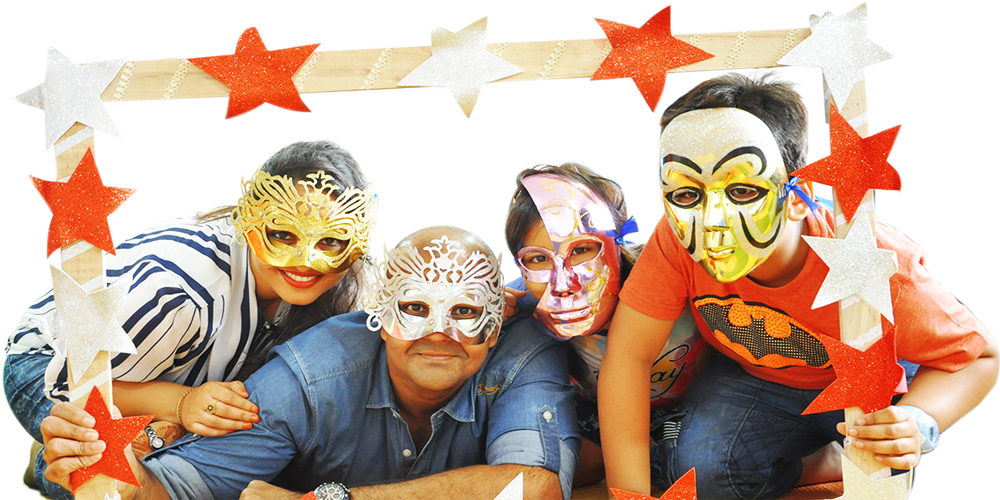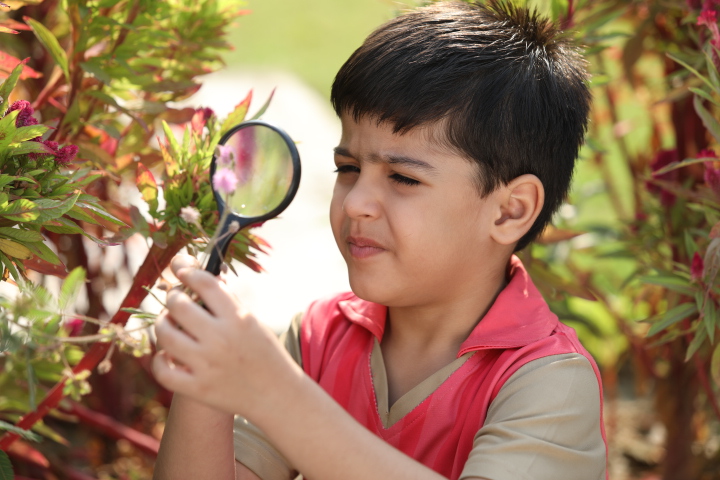Learning at Gurukul
Pre-Primary
Pre-primary years are very critical in a child’s life. The rate of development in these years is exponential. All young children deserve an enthusiastic start during early years of school so that they grow, learn, develop and flourish fully. In these years children make the sense of the world around. Thus, to develop his/her full potential, a child needs stimulating environment which can provide lot of experiences and opportunities to experiment with a variety of objects so that they utilizes all five senses to learn. Play forms an essential tool of learning and it is the highest expression of human development in childhood. Hence, play way method forms a guiding norm for classroom activities.
The domains of learning in Pre-Primary years are-
- Communication Skills, Vocabulary Building and Language Literacy
- Number Sense and Logical Reasoning
- Exploring and Understanding the World Around
- Physical Development
- Social and Emotional Development
- Aesthetic Development and Creative Expression
Communication Skills, Vocabulary Building and Language Literacy
Language is not a means of communication only. We focus on the development of language for wider use where language acts a means to comprehend, convey, think and perceive. Enough opportunities are created for learning language.
Approach to Language Learning- A combination of Whole Language approach and phonics is followed to develop reading and writing skills.
Children learn language through imitating others, encouragement from others and opportunities for listening to and expressing ideas through thoughts and feelings.
Talk Time- Enough opportunities are given to children to sit and talk to each other in structured and unstructured way. This develops listening and speaking skills and children also learn the structure of language in a very friendly way.
Stories and Rhymes- To learn the skills of language rich exposure to stories and rhymes are very crucial. Child is exposed to lot of storytelling, picture reading, comprehension activities and dramatization activities. This helps the child in skilling the child for independent use of language.
Number Sense and Logical Reasoning
Pre- Primary years lay the foundation for number sense and spatial sense. For this, children need to manipulate a lot with concrete material. Every child is provided with teaching learning material and learning happens in a context. This enables the child to learn mathematical skills for a purpose and they find it applicable in their real life too. Pre-Primary years focus on development of skill of comparison, classification, correspondence, seriating, spatial sense, numerical recognition, number sense, patterning, visualization and imagination.
Curriculum of mathematics is developed in collaboration with Jodo Gyan a non-profit organization working on curriculum development for progressive education.
Exploring and Understanding the World Around
Children are intrinsically curious and motivated to learn about the world around them. They are given exposure of real environment where they develop inquiry, collect objects, observe, depict their observation, talk about their experiences and reason out phenomena. This forms the very basis of cognitive development of child in Pre-Primary years. Nature walk, field trips and use of scientific equipment are key elements of environmental education. Connect with real environment helps children in developing sensitivity towards different components of environment and they learn to value and conserve them.
Montessori Lab Activities
Montessori activities are conducted in well-equipped lab where children do activities for real life skill development, language development, sensorial development and socio-cultural development. These activities are done through lots of age specific and need specific Montessori material. Besides structured activities children are also given freedom of choice to choose and pursue the activities of their interest. Self-correction helps the child in identifying and rectifying errors. This facilitates learning in a very natural manner in a non-threatening environment.
Free Play
“Play allows children to use their creativity while developing their imagination, dexterity, and physical, cognitive, and emotional strength. Play is important to healthy brain development” Ginsburg.
Free Play is essential component of learning at Gurukul. Through Free Play, children’s social and cognitive needs are met and developed. Play is the way that children interact with this world and create experiences to understand society and human interaction. Play helps children become self-efficient problem solvers because during play children create and solve their own problems. When a child is asked to solve an academic or real-life problem, they would be able to use the skills that they practice during play to find a solution.
Play is way to learn conflict negotiation, collaboration skill, cooperative skills, strategizing, following directions and problem solving.
Aesthetic Development and Creative Expression
Every child has potential of creative expression and this is right age to bring it to the surface. At Gurukul child is given adequate exposure of Art, Craft, Clay Modeling, Theatre, Dance, Aerobics and other creative movements and creative thinking opportunities. Children express themselves freely during these activities. These activities are also planned to support academic concepts which helps children to see the concepts from aesthetic aspect.
Physical Development
Physical development is given due importance in GPEP. At Gurukul children participate in one or the other sports activity every day. A well-defined curriculum is followed for gross motor and skill development. Yoga activities help in finding balance of mind and body through age specific yoga asanaas and breathing exercises
Primary
We follow CBSE curriculum. Primary school curriculum focuses on experiential learning, developing inquiry, problem solving, and finding real life connect. Interdisciplinary approach is followed so that children understand a concept across the disciplines. Concepts are done in such a way that children find the need and relevance of concepts which makes them imbibe the associated values.
The objective of Primary Curriculum is skill building, all round development, construction of knowledge and developing positive view of oneself and the world around.
Languages
Skills of listening, speaking, reading and writing are the focus of primary curriculum. Building ‘Reading Culture’ in school plays a very crucial role in building of these skills. Children are exposed to wide range of texts, different genres of stories and activities of text analysis and text creation to build a language rich environment. Ample opportunities of talking to classmates, reflecting upon the work, explaining to the peers help the child in making sense of language and development of vocabulary, fluency and ability to create the text.
Mathematics
Concepts of Mathematics are learnt in relation to real life incidents. For each concept child works on contextual problems and solves them with a purpose through lot of hands on activities before moving onto abstract learning. This way child finds the relevance of mathematical concepts in real life. Special focus is on developing number sense, spatial sense, patterning and basic operations.
Curriculum of mathematics is developed in collaboration with Jodo Gyan a non-profit organization working on curriculum development for progressive education.
Environmental Studies
EVS curriculum is deeply rooted in child’s immediate surroundings and yet connected to wider world. It focuses on development of skills of inquiring, observing, recording, analyzing data and reasoning. Students work as a team to explore their real environment and investigate to reach their findings. Field trips, nature walk and use of scientific equipment are key elements of teaching learning process.
Art
Art is treated as a medium of expressing oneself. Hence, children are given lot of freedom of expression and opportunity to create observation based art work. Along with this, Art curriculum includes development of age specific skills and manipulation with different mediums through painting, craft work and clay modeling and creating art work in structured and unstructured manner. Connection of arts with curricular domain develops aesthetic sense of educational experiences.
Dance, Aerobics, Music and Theatre
Students are given exposure to technical aspect of different dance forms and music. Equal importance is given to international and regional dance forms and music. Theatrical activities help in development of expression, language and confidence in students.
Physical Education and Yoga
Physical development is treated as essential aspect of development. Participating in sports activities is essential every day. Proper skill based Physical Education Program is followed at primary level. The objective is to build stamina, agility, strength, self-control, discipline, building self-esteem, concentration and calmness.
Assessment
Comprehensive and continuous assessment is followed in both curricular and co-curricular domains. Assessments form an integral part of learning process and are conducted through different activities like classroom discussions, group observation, individual observation, learning indicators, portfolio work and worksheets. Teachers use daily classroom observation and performance in day to day assignments as a setting for assessment.
Children perceive assessment as measure to know their accomplishments and understand what they need to work upon and not a time of judgment and fear.
The whole feedback to the students and parents is given on the basis of skill based rubrics which form criteria of assessments. As an evidence of assessment and assignments, children maintain their portfolio which is a record of work done by them in the whole session.



 Menu
Menu 


